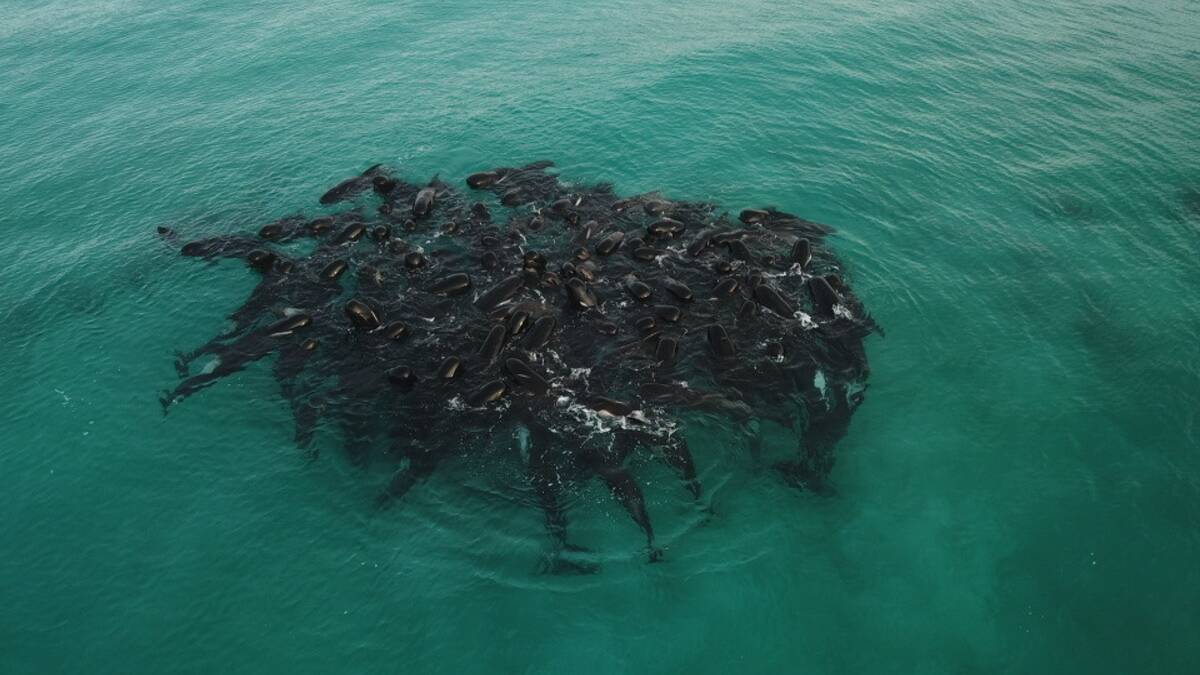Nearly 100 long-finned pilot whales have died in a mass stranding in Western Australia despite a coordinated rescue effort.
The pod were seen grouped tightly together 150 metres off Cheynes Beach, near Albany on the south coast, on July 25 before they became stranded that afternoon.
By the next morning 51 of the whales had died and on July 26 hundreds of volunteers, wildlife experts and authorities rallied to save the remaining 45 animals.
But after shepherding them out to deeper waters the whales beached again later in the evening.
"They were all too weak to survive the night and have now been euthanised," Cheynes Beach Caravan Park said on Facebook.
"We along with all involved are devastated. Again we thank all involved for their tireless efforts to try to save these magnificent creatures."

The state's Parks and Wildlife Service said the difficult decision to euthanise the whales was made to end their suffering.
"We thank everyone who assisted with the attempt to save the whales over the last two days."
IN OTHER NEWS:
A shark advice alert has been issued for the beach as the stranded whales may attract sharks closer to shore.
Optimism some whales could be saved
As rescue efforts were still under way on July 26, wildlife scientist Dr Vanessa Pirotta said when a whale strands the "clock starts ticking" for its survival.
But she said with every stranding there was optimism that some whales could potentially be helped.
"People obviously want us as humans to help these animals out as quickly as possible but the reality is there's a number of things that are needed to make that happen," she said.
"Some of those things are logistics, the team on site, favourable weather and sea conditions, and working out what strategy they would like to use to assist with the best outcome for at least a few individuals."

Dr Pirotta said there was potential for whales taken back out to sea to be stranded again.
"We don't completely know why. But it is most likely that these animals may be disorientated or perhaps are wanting to go back with the rest of the others," she said.
But scientific research has found some whales have successfully moved on after being rescued from a stranding, Dr Pirotta said.
"While this is a terrible situation there is a silver living to events like this," she said.
"There is potential for some to be re-floated which is a good thing but those that have passed will act in service to provide knowledge to the scientific community."
Why pods of whales become stranded
There are several theories about why whale pods become stranded, Dr Pirotta said.
"Perhaps there was a sick individual and the rest followed, they may have been fleeing a predator - so there are killer whales potentially in the area, it might be a safety in numbers thing.
"Maybe there was acoustics or some underwater sound that may have spooked them or maybe they're just somehow disorientated."
But she said this stranding was unique with scientists able to observe the pod's behaviour beforehand.
Dr Pirotta said the drone footage of the pod offshore was something she hadn't seen before.
"Largely offshore species huddled in that group in shallow waters is unusual," she said.
"The formations and way they were acting is interesting and I've never seen pilot whales huddled up like that really close to shore.
"This event will no doubt be a contribution to the scientific community and will add that extra piece of the puzzle to the mystery around whale strandings globally."


